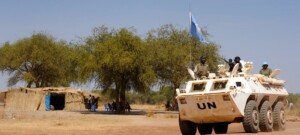Analyst Hafiz Ismail: ‘Why is the government not solving any of these bigger problems?’
Radio Dabanga interviewed activist, economist, and political analyst Hafiz Ismail on current economic and political affairs in Sudan, including the economic recession, liberalisation measures, and the defence budget.
 Bread and fuel protests in Khartoum earlier this year (social media)
Bread and fuel protests in Khartoum earlier this year (social media)
Radio Dabanga interviewed former banker and civil society activist Hafiz Ismail on current economic and political affairs in Sudan, including the economic recession, liberalisation measures, and the defence budget.
The past weeks saw various protests throughout Sudan as economic hardships triggered by a recession and high inflation rates continue to affect Sudan’s population, especially its youth. Witnesses in Khartoum reported protests with burning tyres as people demonstrated earlier in June after the government lifted fuel subsidies.
The protest came at a time when the Ministry of Finance announced plans to continue the liberalisation of Sudan’s economy whilst admitting that citizens would initially suffer from those policies.
Prime Minister Abdallah Hamdok also defended the cancellation of subsidies on commodities and fuel and the liberalisation of the Sudanese Pound.
Food and other commodity prices have been on the rise in Sudan. OCHA reported that prices continued to rise in April. This is especially difficult for Sudan's displaced.
Earlier this year and for the second half of last year, Sudan was engulfed by a wave of protests against recent price increases in consumer goods, fuel, and subsidised bread shortages.
Economic recession and inflation
In the interview, economist and political analyst Hafiz Ismail explained that Sudan indeed experiences both a recession and severe inflation, but that both problems require vastly different policies. “For the recession, you need to push the economy, you need to inject a lot of cash so the economy can grow. For inflation, you have to use measures that will demand money, to cut the use of money in the economy so that you can control the prices”, the economist explained.
The problem is that when you have a recession accompanied by inflation, the policy meant to alleviate one will worsen the other.
“The dangerous thing here is not the inflation, it is the recession”, Ismail warned. According to the economist, anti-inflation policies such as the removal of subsidies will harm the economy in the long run.
“In agriculture, the farmer will not be able to cultivate because if you double the price of fuel then the cost of the input is going to double, their travel cost is going to double. Because fuel is not only a product we consume but also an input for more of our products” he explained.
“By removing subsidies, the authorities believe they will cut government expenditure because fuel subsidies present around 36% of the government budget, but what you actually need now is to inject cash into the economy”.
'If the price of fuel goes up, people will produce less and, in real terms, the economy is going to shrink.'
“If the price of fuel goes up, people will produce less and, in real terms, the economy is going to shrink. If the economy is going to shrink, people lose their jobs and that affects your taxes and thus the state income”, the economist explained.
As an example, Ismail mentions the 2008 global economic crisis, during which “the USA central banks, the Bank of England, and the European Central Banks printed dollars and injected a load of cash into the economy so that companies could grow and employ people”.

Subsidy removals and liberalisation
The economist also explained that, when the government asked the IMF and the international community for debt relief and the establishment of the Samarat Family Support programme, the support they received came with a package of desired measures which include the gradual removal of subsidies and the liberalisation of the exchange rate.
'You cannot remove subsidies in a country where more than 80 per cent of the people are living below the poverty line' – Hafiz Ismail
“You do that, but you cannot do that in a country where more than 80 per cent of the people are living below the poverty line,” he said.
Furthermore, Ismail explained that the country’s positive steps towards debt relief do not necessarily mean that there will be more money for Sudan’s economy: “Debt relief has only to do with the books and dollars of the creditors”. “What they do for you is improve your credit rating so you can borrow money, but to borrow other liberalisation and cutting measures will be introduced”.
At the moment, “People don’t enjoy three daily meals and cannot get medicines because they cannot afford it. People cannot send their kids to school. They are not economically viable now that the fuel prices increased so much,” he explained.
'You cannot just introduce one policy of removing subsidies and expect the economy to adapt. You are killing the economy, not actually reviving it.'
According to Ismail, the government needs to do a complete overhaul of the economic system to substantially reform it. "You cannot just introduce one policy of removing subsidies and expect the economy to adapt. You are killing the economy, not actually reviving it. That is a very dangerous development,” he said. “Economic problems need to be addressed in a holistic manner, not with business policies.”
The economist said that the government has bigger issues that need solving than the cost of its subsidies. “You have an economy whose infrastructure has totally collapsed, you have corruption, you have a banking sector that needs reforms, you have monopolies, you need tax reforms, you have companies that are supposedly publicly owned but no one knows how they operate”.
'Why are they not solving any of these bigger problems?'
“Over 40 per cent of the companies owned by the security and armed forces have never published their accounts” Ismail complained. “These are publicly owned. They are supposed to be under the jurisdiction of the Ministry of Finance. Why is the government for such an easy target policy [as fuel subsidy removal]? Why are they not solving any of these bigger problems?”

Defence budget
In addition to the lack of supervision on the defence industry, Hafiz Ismail warned of the height of the defence budget and spending.
“We must have, most of all, a strategic plan for what the defence and security needs of Sudan are and to establish an army according to those needs”, Ismail explained.
“But to establish an army to employ armed movements and Rapid Support Forces within it, and make a huge army with no need for it… Who is going to pay that bill? The country cannot afford it”.
“It is far better to invest this money in infrastructure, which has been totally destroyed, and to allow the economy to grow”, Ismail advocated.
'If you have such a big defence budget, no one will come and invest here.'
He also warned that “if you have such a big defence budget, no one will come and invest here”
In January, economist Prof Mohamed Sheikhoun criticised elements of the 2021 budget, especially the huge budget allocated to the defence system but also the removal of fuel subsidies and the increase in electricity fees.
He told Radio Dabanga in January that the government had practically abandoned the provision of commodities by removing essential subsidies on fuel and electricity.

Hafiz Ismail
Former banker, economist, political analyst, and civil society activist Hafiz Ismail is a leading member of the Sudanese panel of experts, many of whom have lived in exile since 1989. He has been interviewed by Radio Dabanga on multiple occasions. He is also head of the civil society organisation Justice Africa Sudan.











 and then
and then